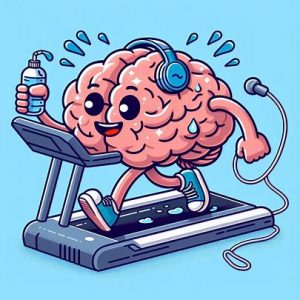Fighting the Effects of Aging – part 2 Cognitive Decline
Posted on by Ross HarrisIn the quest for eternal youth, we often focus on physical appearance and vitality, but what about the health of our most vital organ—the brain? As we age, cognitive decline becomes a common concern, affecting memory, attention, and overall mental sharpness. Fortunately, a powerful ally is readily available: aerobic exercise. Research consistently shows that engaging in regular aerobic activities not only benefits our cardiovascular health but also plays a crucial role in preserving and enhancing cognitive function as we age.

Understanding Cognitive Decline
Before delving into the positive effects of aerobic exercise on cognitive function, let’s briefly explore why cognitive decline occurs. Aging naturally brings changes to the brain, including a reduction in the size of certain regions, diminished blood flow, and alterations in neurotransmitter levels. These changes contribute to a decline in cognitive abilities, such as memory, attention, and processing speed. Lifestyle factors, such as exercise, can influence the extent of these changes and are a key player in promoting brain health.
The Brain-Boosting Benefits of Aerobic Exercise
- Increased Blood Flow and Oxygen Supply:
Aerobic exercise involves activities that elevate the heart rate and increase blood circulation throughout the body. This enhanced blood flow delivers a fresh supply of oxygen and nutrients to the brain and supports the overall health of brain cells. Improved blood flow is associated with better cognitive function as it ensures that the brain receives the oxygen and nutrients it needs to function optimally.
- Neurotransmitter Release:
Aerobic exercise triggers the release of various neurotransmitters, including dopamine, serotonin, and norepinephrine. These chemicals play a crucial role in regulating mood, attention, and memory. Additionally, exercise has been linked to increased levels of brain-derived neurotrophic factor (BDNF), a protein that supports the growth and maintenance of neurons. The combination of neurotransmitter release and increased BDNF supports learning, memory, and overall cognitive function.
- Reduction of Oxidative Stress and Inflammation:
Aging is associated with increased oxidative stress and inflammation, which can contribute to the deterioration of brain cells. Aerobic exercise has been shown to reduce oxidative stress and inflammation, providing a protective effect on the brain. Regular physical activity stimulates the production of antioxidants that neutralise harmful free radicals, helping to maintain the health and integrity of brain cells.
- Enhanced Neurogenesis:
Aerobic exercise has been linked to increased neurogenesis, the process by which new neurons are generated in the brain. This occurs primarily in the hippocampus, a region critical for learning and memory. The creation of new neurons is essential for maintaining cognitive function and has been associated with improved memory.
Incorporating Aerobic Exercise into Your Routine
To reap the cognitive benefits of aerobic exercise, it’s essential to incorporate regular physical activity into your routine. Aim for at least 150 minutes of moderate-intensity aerobic exercise per week, such as brisk walking, jogging, swimming, or cycling. Alternatively, engage in 75 minutes of vigorous-intensity exercise, such as running or high-intensity interval training (HIIT).
In the pursuit of healthy aging, preserving cognitive function is paramount. A potent tool in this endeavour is aerobic exercise. So, lace up those trainers, hit the pavement, and let your journey to a sharper, more resilient mind begin!

Leave a Reply